And still they comepublished at 15:40
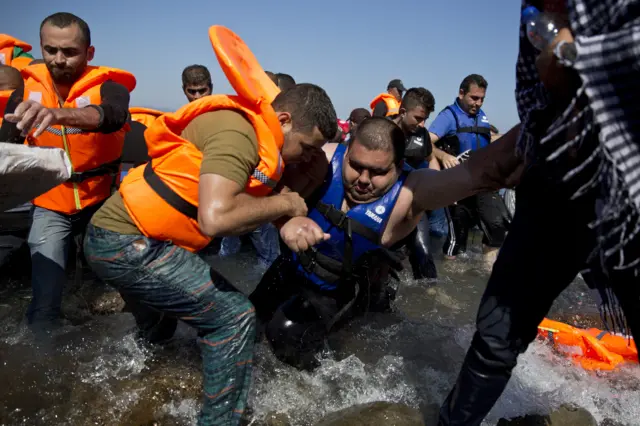 Image source, AP
Image source, APMigrants are continuing to arrive aboard dinghies after crossing from Turkey to the island of Lesbos in Greece
Croatian PM says his country cannot become a "migrant hotspot"
The country closes seven of eight road border crossings with Serbia
More than 13,000 people have crossed into Croatia since Wednesday
Hungarian PM says a fence is being built along its border with Croatia
A migrant is electrocuted at the Eurotunnel entrance in France
Mohamed Madi, Alastair Lawson and John Harrison
 Image source, AP
Image source, APMigrants are continuing to arrive aboard dinghies after crossing from Turkey to the island of Lesbos in Greece
The decision by Croatia to close seven of its eight border crossings with Serbia is not a solution, UNHCR Europe Director Vincent Cochetel has told the BBC.
"For us this is very unfortunate," he says.
"There is a way to put in place a border procedure that is consistent with European legislation or international legislation in order to screen out again who is in need of protection and who is not in need of protection.
"Closing borders like it's happening over the last couple of days won't solve the problem. People are on the move, people are desperate.
They want to find safety and there is no quick fix."
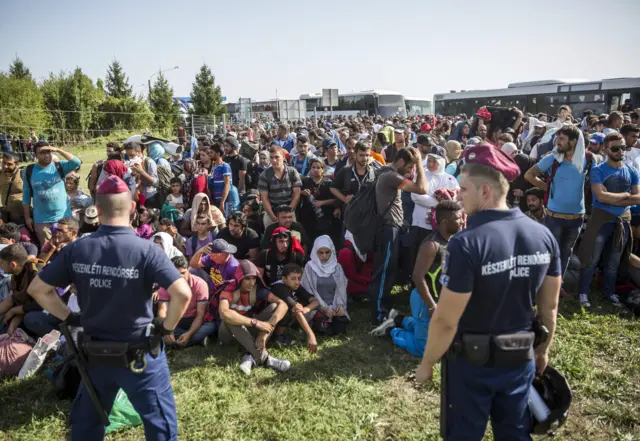 Image source, EPA
Image source, EPAHungarian policemen keep a close eye on a large group of migrants and refugees at a border crossing between Hungary and Croatia
About 15.400 migrants have entered Croatia so far today, according to the government's website, external (in Croatian).
It also reports that Prime Minister Zoran Milanovic is due to attend a national security meeting later this afternoon.
A reporter for the EU Observer at the Hungary-Croatia border tweets:
Allow X content?
This article contains content provided by X. We ask for your permission before anything is loaded, as they may be using cookies and other technologies. You may want to read X’s cookie policy, external and privacy policy, external before accepting. To view this content choose ‘accept and continue’.
A Channel 4 News reporter on the border tweets:
Allow X content?
This article contains content provided by X. We ask for your permission before anything is loaded, as they may be using cookies and other technologies. You may want to read X’s cookie policy, external and privacy policy, external before accepting. To view this content choose ‘accept and continue’.
One of those joining the thousands of people fleeing Syria and heading for Europe is pianist Ayham al-Ahmad.
Videos of him defiantly playing piano in the Yarmouk refugee camp on the outskirts of the Syrian capital, Damascus, have been widely shared online.
But he told the BBC's Ian Pannell that he was forced to leave after facing food shortages and other struggles.
You can watch our report on him and his journey below.
Allow YouTube content?
This article contains content provided by Google YouTube. We ask for your permission before anything is loaded, as they may be using cookies and other technologies. You may want to read Google’s cookie policy, external and privacy policy, external before accepting. To view this content choose ‘accept and continue’.
Many of the migrants trying to make their way to Europe are coming from Syria, and several top officials have called on more to be done to try and end the conflict there.
In the last few minutes, US Secretary of State John Kerry has said that President Obama believes military talks with Russia on the Syria crisis is an "important next step" and that discussions could happen "very shortly".
Mr Kerry's comments come after several days of stories suggesting that Russia is now militarily involved in the war in Syria.
Earlier this week, US General John Allen told the BBC that ending the conflict in Syria and neighbouring Iraq was key to solving the migrant crisis in Europe.
More from the Reuters news agency on those buses full of migrants arrived on the Croatian side of the border with Hungary.
A Reuters reporter at the village of Beremend says the migrants are being taken off the buses, but there seems little chance of them being allowed to cross the border.
Hungarian police and soldiers have reportedly formed a line along the border with Croatia, and two military vehicles mounted with machine guns have also taken up position.
Hrvoje Kresic, external, a Croatian journalist at the scene, sent the tweet below just a few minutes ago.
Allow X content?
This article contains content provided by X. We ask for your permission before anything is loaded, as they may be using cookies and other technologies. You may want to read X’s cookie policy, external and privacy policy, external before accepting. To view this content choose ‘accept and continue’.
The BBC's Christian Fraser, who is on Croatia's border with Slovenia says some migrants hoping to cross into Slovenia are being turned away by authorities.
In the last few minutes, Slovenia's interior ministry state secretary, Bostjan Sefic, has told a news conference: "At the moment we have no basis on which we could form a corridor [to allow migrants to pass through the country]".
At the moment, it appears migrants in Croatia are unable to leave the country through its northern border into Slovenia or Hungary.
Allow X content?
This article contains content provided by X. We ask for your permission before anything is loaded, as they may be using cookies and other technologies. You may want to read X’s cookie policy, external and privacy policy, external before accepting. To view this content choose ‘accept and continue’.
A Wall Street Journal reporter on the border tweets:
Allow X content?
This article contains content provided by X. We ask for your permission before anything is loaded, as they may be using cookies and other technologies. You may want to read X’s cookie policy, external and privacy policy, external before accepting. To view this content choose ‘accept and continue’.
The Reuters news agency is reporting that as many as 10 buses packed full of migrants have just arrived at the Croatian side of the border with Hungary. It remains unclear what will happen to those people, especially given Hungary's stated position that it will not take any more undocumented people.
For those of you just joining us, tens of thousands of people are continuing to try and find a way to Western Europe through the Balkans today.
Croatia's prime minister says his country can no longer take in and house any more migrants, but his government says asylum seekers can pass through.
Many are trying to do so, heading to Croatia's border with Slovenia, where groups of refugees have been arriving throughout the morning.
Slovenia's interior ministry state secretary, Bostjan Sefic, says the country expects 1,000 migrants to cross from Croatia in the next 24 hours.
This map below shows the region and which countries there are part of the Schengen zone, which allows freedom of movement between states. You can read more about the Schengen Agreement here.
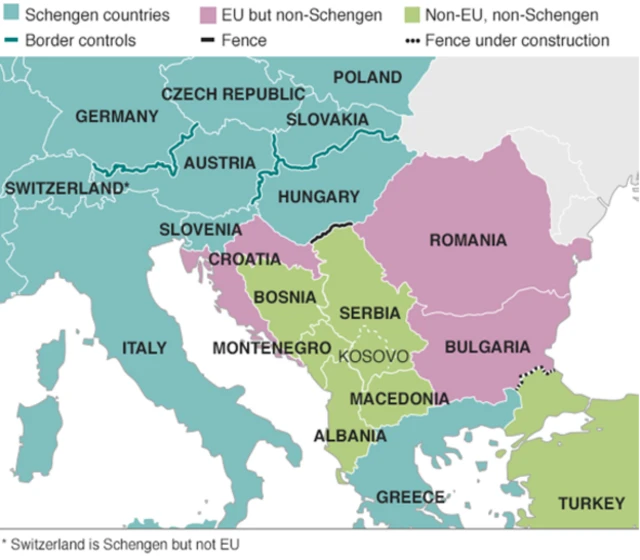
At a news conference earlier today, Croatia's prime minister said the country could not accommodate any more migrants or refugees.
You can read his comments in full via the link below, shared by the Croatian government Twitter account.
Many of those trying to cross through Europe are attempting to get into Germany. Here's a breakdown of where the asylum-seekers who make it to Germany are from.
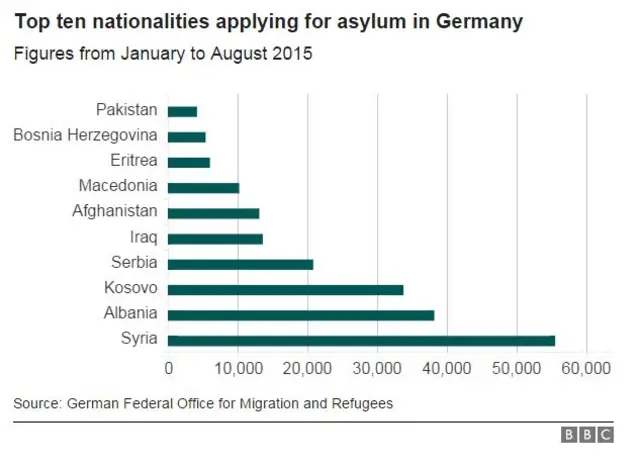
BBC producer at the crossing tweets...
Journalist for Global Post at Croatia's border with Serbia tweets:
Allow X content?
This article contains content provided by X. We ask for your permission before anything is loaded, as they may be using cookies and other technologies. You may want to read X’s cookie policy, external and privacy policy, external before accepting. To view this content choose ‘accept and continue’.
BBC producer at Croatia-Slovenia border...
Some more quotes from Croatia PM Zoran Milanovic, who earlier said his country cannot become a "migrant hotspot". For more, read our main news story here.
Quote MessageCroatia has shown that it has a heart - and we all know it now - as a country and as a people. But we now need to remind our neighbours and the EU that we also have a head and that we know what is good for our interests and our security.
Zoran Milanovic, Croatian Prime Minister
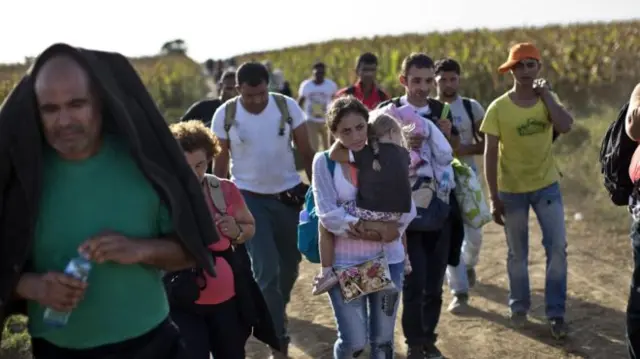 Image source, AP
Image source, AP